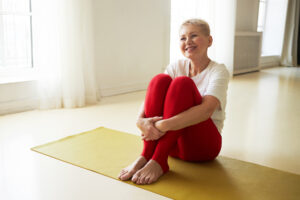Menopause Changes
Nearly every woman who has gone through menopause can attest to the numerous changes that come with it and are the results of lower estrogen levels in female bodies. Menopause changes can pose several health risks for women, both physical and mental. Some of the health issues postmenopausal women face are:
- Heart Disease: Estrogen helps keep blood vessels flexible, but this is a benefit that’s lost after menopause. A study published in February 2021 also linked persistent hot flashes to future cardiovascular disease.
- Osteoporosis: Women’s bones are protected by estrogen before menopause, but a year before menopause is finalized and for a few years after, the American College of Obstetricians and Gynecologists has found that bone loss is very rapid.
- Weight Gain: Though many women consider this solely an issue of aesthetics, the changing metabolism resulting from menopause actually puts women in risk of type 2 diabetes.
- UTIs: The vaginal tissue can become thinner and drier due to lower estrogen levels, thus increasing the risk of UTIs, as bacteria has more fertile ground in which to grow.
Along with the physical issues that women face as a result of menopause, studies also find that older women are also more likely than men to develop not only chronic health problems, but also cognitive problems. Anxiety, for example, affects 10-20% of older adults, but it often goes undiagnosed or is misdiagnosed as a side effect of other medications. Older adults may often leave mental health issues untreated since they commonly dismiss them as aches of their older age. Here are some ways in which you can recognize anxiety in older adults and help them seek appropriate treatment:
- Generalized Anxiety Disorder (GAD) may be what we most often see older adults struggle with, as those with GAD worry about a plethora of things (such as declining health, money, safety, family problems) when there may be little to no reason for such worries. It can lead to sleeplessness and difficulty relaxing, as well as fatigue, aches, irritability, nausea, and other physical symptoms.
- Social Phobia or Social Anxiety Disorder is when someone feels anxious or overly self-conscious in social situations. Older persons may experience heightened self-consciousness or embarrassment in social situations because of possible declining health, aging, and change in appearance. This can lead to loss of friendships or difficulty socializing, and can be accompanied with physical symptoms of sweating, trembling, and difficulty talking.
- Specific phobias, in general, mean the intense fear of a situation, place, or event that may pose little to not threat. Phobias common among elders are fear of death and disaster to family. Thinking about, or facing, these situations can cause severe anxiety or a panic attack.
Remember that even though older adults may dismiss issues of mental health, these problems are very real and can have a severe effect on physical health. Thankfully, they are also treatable with the assistance of a mental health professional or consistent therapy. Contact our offices, serving Buffalo, Williamsville, and WNY, to schedule an appointment to talk to your doctor about your body’s menopausal changes: WYN OBGYN.

